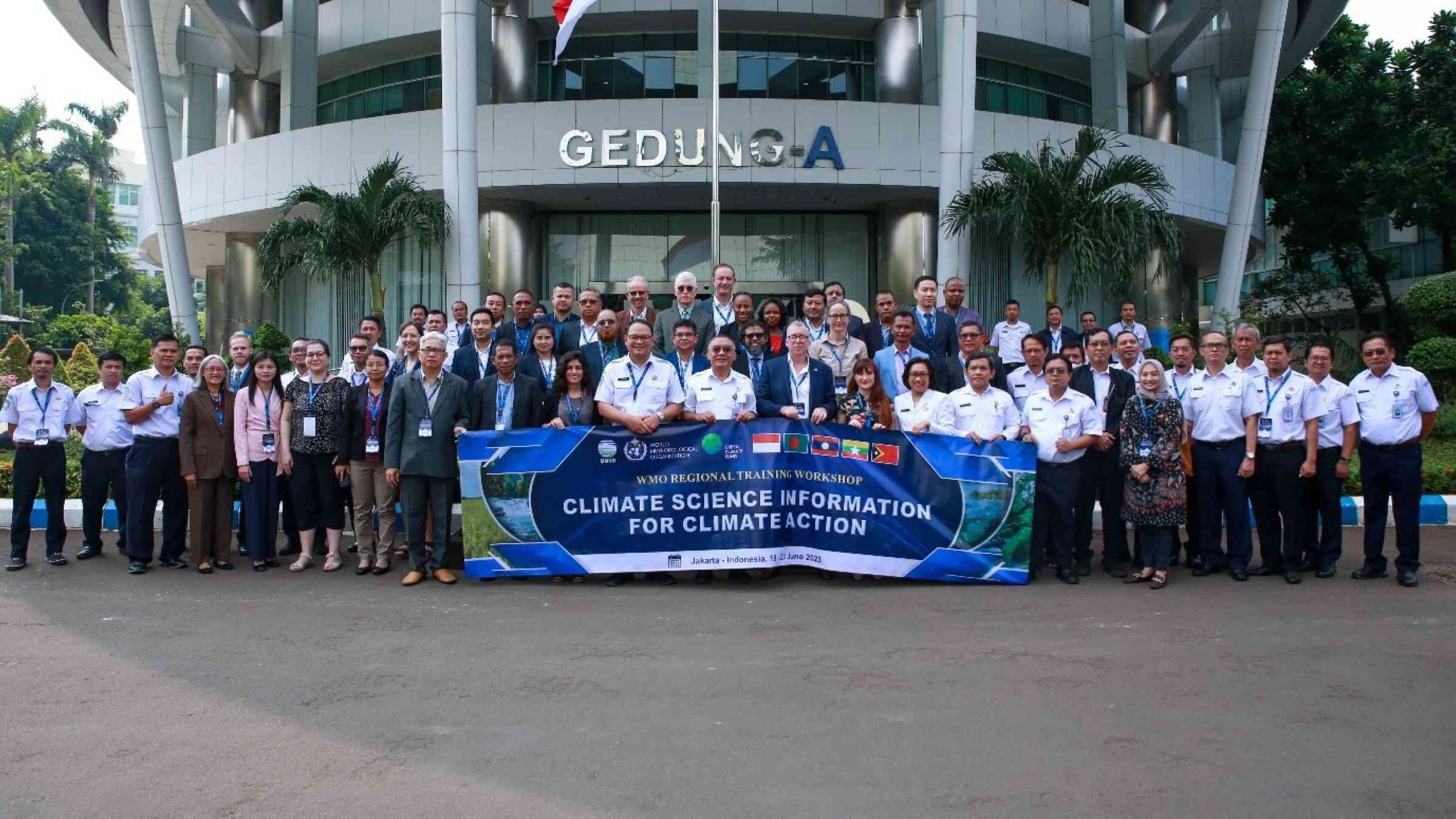Equipping Asian countries with climate science information for climate action

Effective climate change action entails understanding the climate science, as well as the increasingly volatile and intense hazard events that are changing the vulnerability and exposure of people and ecosystems to potential future disaster risks. This was the background for the staging of the Climate Science Information for Climate Action Regional Training Workshop, targeting five countries in Asia from 19-23 June 2023.
Around 50 participants and thematic experts participated in the workshop, jointly organized by the World Meteorological Organization (WMO) and Green Climate Fund (GCF) in partnership with Badan Meteorologi Klimatologi dan Geofisika (BMKG), the meteorological office of Indonesia. Representatives from Bangladesh, Indonesia, Lao People’s Democratic Republic (PDR), Myanmar and Timor Leste gathered in Jakarta to enhance their understanding and application of climatic and non-climatic information, primarily for the development of project proposals that will be submitted to the Green Climate Fund (GCF) or other funding entities.
The workshop was timely, being held days on the heels of the 58th session of the Subsidiary Bodies (SB 58) of the United Nations Framework Convention on Climate Change (UNFCCC) and the Paris Agreement, which took place from 5-15 June 2023 in Bonn. Both events, though different in scope and scale, were aligned in their focus on building the capacity of national stakeholders for climate action.
Climate Science Lead at the GCF, Kevin Horsburgh, provided an overview of important elements of a successful project proposal, particularly the need for a strong climate rationale that is informed by sound interpretation of climate science information. Strong emphasis was also given to country priorities as a driver for the development of projects and the selection and use of appropriate tools.
As part of UNDRR’s comprehensive (disaster and climate) risk management approach, the United Nations Office for Disaster Risk Reduction (UNDRR) supported the participation of disaster risk reduction government officials from some of the participating countries, and helped delegations better understand the interaction between disaster risk and climate drivers. This was complemented by information on how data on losses and damage can be integrated in the proposals being developed, including the use of the disaster losses and damage database (DesInventar) and Risk Information Exchange (RiX), an aggregator of information.
Roshni Dave, Scientific & Project Officer from the WMO, noted that, “The key aim is to enhance the capacity of different stakeholders including national meteorological and hydrological services (NMHSs), UNFCCC Parties, DRR focal points and climate finance project developers to better understand and incorporate climate science information in national adaptation plans, policies and investment decisions.”
Mr Yoga Sofya, DRM Adviser, Civil Protection Authority, Ministry of Interior in Timor Leste, noted that, “Having been here and understanding this [climate science information], I can support colleagues by being more involved.” For her part, Sonekham Phommahaxay, Deputy Director Disaster Prevention, Social Welfare Department in Lao PDR, attending the workshop stated that, “I understand more the need to work together in the development of projects. I will go back and coordinate with climate change colleagues to development projects.”
Khin Myo Thant, Department of Agriculture, Ministry of Agriculture, Livestock and Irrigation, Myanmar, said that, “Thanks to the workshop, by getting knowledge and expertise, and information from past events and climate projection for future planning, we can now process how to make action plans for the future and improvement of livelihood for farmers and communities.”
Adding more clarity on the scope of the workshop was Ilaria Gallo, Scientific Officer - Climate Science Capacity Development with the WMO, who stated that, “This workshop is plugged into a broader capacity development programme under a WMO and GCF collaboration on climate science info for climate action.” She went on to explain that this type of workshop started with a pilot phase from 2018 to 2021, during which four national workshops targeting least developed countries (LDCs) and small island developing states (SIDS) were held. This workshop, being held during the implementation phase of the initiative, is the second regional workshop, the first of which was held in South Africa in September 2022.
Country delegates came prepared with project ideas for future GCF funding. The workshop was instrumental, therefore, in facilitating greater interrogation of the climate rationale as well as the relevant risk data and information that will enhance their concepts. Jenty Kirsch-Wood from UNDRR noted that the workshop was, “the chance to listen, learn and co-create potential solutions with national and global experts has been really exciting and beneficial.” Among the topics for potential pipeline projects were enhancing early warning systems, strengthening agro-forestry approaches, adaptation in the coffee sector and improving greenhouse gas emissions reduction measures to enhance opportunities for participating in carbon markets.
The work of countries was commended by Ilaria, who observed that, “Countries were very active and committed, and grasped the theory around climate science and application of the tools that were developed by WMO as well as those provided from various institutions.” It was noted that the countries will require further support to apply these tools at the broader national level, including the use of climatic and non-climatic information for adaptation and mitigation initiatives.
UNDRR, including the Regional Office in Asia-Pacific (ROAP), will support countries where demand is expressed and resources are available. Ongoing initiatives such as the Early Warning for All will be instrumental in this regard. Countries can also benefit from the application of tools such the guidelines for integrating DRR in national adaptation plans (NAPs) at the national and subnational levels.